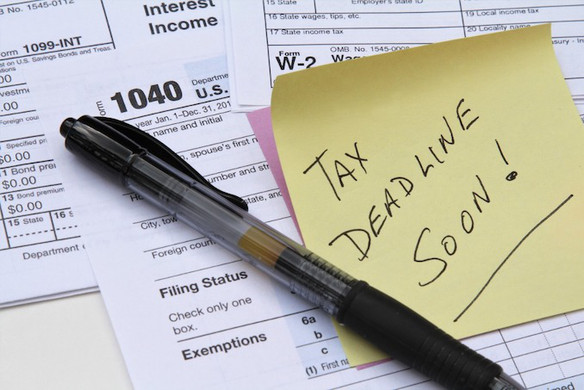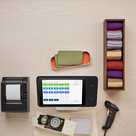Table of contents
Does the thought of tax season make you break out in a cold sweat? You’re not alone. The majority of Americans find the process of filing taxes stressful. The fact that you own a business only adds to the pressure.
But don’t worry! There’s hope. No matter what month of the year it is, “right now” is always a good time to put a system in place to make filing business taxes easier.
First, we’ll get to the roots of the problem—the reasons tax season is stressful. Then we’ll cover some simple steps you can take to make tax season, and the rest of the year, run smoothly.
And if doing your own bookkeeping tax prep isn’t your idea of a good time, check out Bench—we’ll do your bookkeeping for you.
Why is tax season stressful?
Before you can start plotting your tax season master plan, you need to understand the roots of the problem. A few elements in particular can make tax season difficult.
High stakes, and uncertainty
Penalties for late filing or inaccurate business reporting cost you money out of pocket. And while no-one is quite sure how or when the IRS decides to trigger audits, avoiding a “fishy” looking tax return isn’t a bad idea. An audit is time-consuming, inconvenient, and potentially expensive.
When you’re not sure whether you’ve got all the info you need to file correctly, or you’re worried you won’t be able to file on time, the spectre of IRS penalties is always lurking over your shoulder.
Elusive, mysterious tax deductions
Depending on what types of expenses you pay for in the course of running your business, you could stand to claim a significant amount in itemized tax deductions. Alternately, you could save more money by claiming the standard deduction.
Without the numbers to back it up—expense records, and up-to-date books—there’s no way to decide for sure. And the wrong choice means leaving money on the table.
Scattered business records
If you’re behind on your bookkeeping—meaning you don’t have up-to-date financial statements for your business—it’s impossible to accurately determine your expenses and income for the year.
Enter the proverbial “receipt shoebox.” You may find yourself digging through cluttered documents to get the info you need, with a tax deadline looming. Unless you love the smell of thermal ink, that’s a grim prospect.
Three ingredients for a stress-free tax season
Get right down to it, and the key components of a stress-free tax season aren’t that complicated. In fact, there are only three of them—and they all work together to make filing easy.
1. Organized records of all your transactions
Business records can take the form of bank and credit card statements, emailed receipts, point-of-sale reports, or even old-fashioned print receipts from a cash register. In any case, you need to save every record of money entering or leaving your business.
These records need to be current, organized by date, and easy to check. That’s because your bookkeeping will be based on them. (More on that shortly.)
Heads up. Your records serve a second purpose besides bookkeeping. If you’re claiming deductible expenses on your taxes, you need to have records of those expenses on hand in case of an audit. If you’re audited and can’t back up your claims, you’ll have to pay back the money that was deducted—and then some, in the form of penalty fees.
2. A bookkeeping system
It’s not enough to look back over your records to figure out when you’ve earned income or paid expenses. All of those transactions need to be entered by date and categorized, so you know how your money is being made and spent. For that, you need a bookkeeping system.
With the transactions recorded in your books, you can generate financial statements. They give you the information you need to monitor the financial health of your business—and accurately file your taxes.
3. Financial statements
Financial statements are generated on a monthly or quarterly basis. They’re based on your recorded bookkeeping transactions. There are two types of financial statements that are essential to every small business, plus a third you may or may not need.
- The balance sheet tells you how your business books currently stand—how much money you have on hand to work with, and how it’s categorized.
- The income statement summarizes how much money you’ve made over a certain period, and how much you’ve spent. This is where you keep track of your income and expenses, and see how the two affect each other.
- The cash flow statement is only necessary if you use the accrual method of accounting. It makes adjustments to your books to account for money you’ve earned but haven’t received. An example would be work you’ve invoiced, but haven’t received payment for.
Looking at your financial statements, you can judge how your business is performing, see how money is entering and leaving it, and spot long-term trends.
Most importantly, preparing year-end financial statements—which summarize your business performance for the year—gives you the information you need to file your taxes accurately.
How make tax season easy, starting now
As the Boy Scouts say, “Always be prepared.” Make the proper preparations now, and you can finally earn that “Stress-Free Tax Season” badge. Here are three steps you need to take to start getting prepared for the end of the financial year.
1. Establish a record-keeping system
Say you run a vintage clothing store. Your email receipts for expenses go to your inbox, while paper ones go in a drawer near the bottom of your desk. Point-of-sale income shows up in your Square report, while online sales are reported by your ecommerce software. And, once in a blue moon, a customer actually pays with cash, and you write it down. Now, where did you put that spiral-bound notebook…
You need to keep all your records in one place, and organized by date. Whatever bookkeeping option you go with, its accuracy will depend on comprehensive records of income and expenses.
At the end of every month, gather records of all your income and expenses. Each one will be different—you may have a transaction summary downloaded from Square, and a spreadsheet saved from Excel.
That’s fine: So long as they each cover the month, get them all together and save them in folder on your computer. (Or, even better, in the cloud.) Then, keep your folders organized by date and year, so you can easily refer to them.
Also, consider using apps to make the job easier, and consolidate all your info. For instance, Expensify lets you record business expenses on the fly, and keep them all in one place.
This is the simplest way to set up a recordkeeping system. It puts everything in place to make bookkeeping easier.
2. Start bookkeeping
A bookkeeping solution will give you a dated list of all your business transactions. It can also give you monthly and annual financial reports, which you’ll use to track your business health and file your taxes.
You’ve got a few options when it comes to bookkeeping. Which one you choose will depend on your budget.
Spreadsheets
If your business is small and pretty straightforward, a simple spreadsheet may be enough to track money entering and leaving it. There are a variety of templates for this available online.
- Advantage: It’s free.
- Disadvantage: You’ll have to enter and categorize every transaction yourself. If you make an error or omit something, this could lead to inaccurate books. Plus, it takes time to do your own bookkeeping.
- Who it’s for: Small, simple businesses just starting out, who have limited resources to invest.
Accounting software
With accounting software, you enter your transactions by hand. The software keeps a dated record of them, and can generate monthly financial reports.
- Advantages: It’s relatively inexpensive, and there are a wide number of options to choose from.
- Disadvantages: Accounting software isn’t known for its shallow learning curve—you’ll need to take time to get accustomed to it. You’ll also be using up your own time to enter transactions by hand. And any errors on your part will result in incorrect financial statements.
- Who it’s for: Businesses that are a bit too complex for spreadsheet bookkeeping, but not ready to hire a bookkeeper. Or business owners who are already familiar with some principles of accounting and bookkeeping—such as the general ledger, COGS, and transaction categorization.
A professional bookkeeper
When you have a bookkeeper working for you, they take all your business records, then categorize your transactions. Then, they generate accurate monthly and yearly financial statements.
- Advantages: Of all your options, this requires the least amount of time or expertise on your part. And your books are guaranteed to be accurate and up to date.
- Disadvantages: It costs a bit more than accounting software—although, that depends on how much you value your personal time. Bench starts at $119/month, and handles everything for you.
- Who it’s for: Business owners with a lot on their plates, who don’t have time to mess around with spreadsheets or accounting software.
3. Start getting financial statements
Here’s the real key to an easy tax season: accurate, comprehensive financial statements. Depending on which bookkeeping system you’ve got working for you, you’ll get financial statements differently:
- Spreadsheets. It’s up to you to crunch the numbers yourself—with or without the help of a spreadsheet template. You can also send your records to an accountant every month, and they’ll generate financial statements for you.
- Accounting software. Most accounting software will generate financial statements for you. Keep in mind, the accuracy of these statements depends on your own handiwork. If you’ve incorrectly entered or categorized your transactions, your financial statements will be inaccurate.
- A bookkeeper. A bookkeeper will create accurate financial statements based on the transactions they’ve entered and categorized for you. This the most surefire way to get accurate statements. They’ll also give you year-end financial statements, which you can use to file your own taxes, or hand off to an accountant who handles the filing. Some services, like Bench, can even file your taxes for you.
Whichever bookkeeping option you choose, the most important thing is that you get financial statements regularly, and that they’re error-free.
An easy tax season benefits you year-round
Here’s a nice bonus. If you follow these steps to make tax filing easier, you won’t just make tax season stress-free. You’ll improve the way you run your business.
First of all, keeping comprehensive records of all your income and expenses will protect you in case of an audit.
Then, regular financial reports let you keep track of your financial health. You can also use them to spot trends in your finances, and make smart business moves.
If you ever decide to get funding via a loan or line of credit—financial reports will prove to be essential. The same applies if you decide to bring on investors. And finally, if you decide one day to sell your business, the buyer is going to expect accurate financial statements.
The moment you start keeping records, put a bookkeeping system in place, and use financial statements to plan your business, you set yourself up for smooth sailing ahead. Remember, “right now” is never too soon to start—and future you will be glad you did.
About Bench
Bench is the largest bookkeeping service in America. We take care of your bookkeeping by pairing you with your own dedicated bookkeeping team. Plus we give you simple software to track your finances and cash flow. Learn more at Bench.co.
![]()











